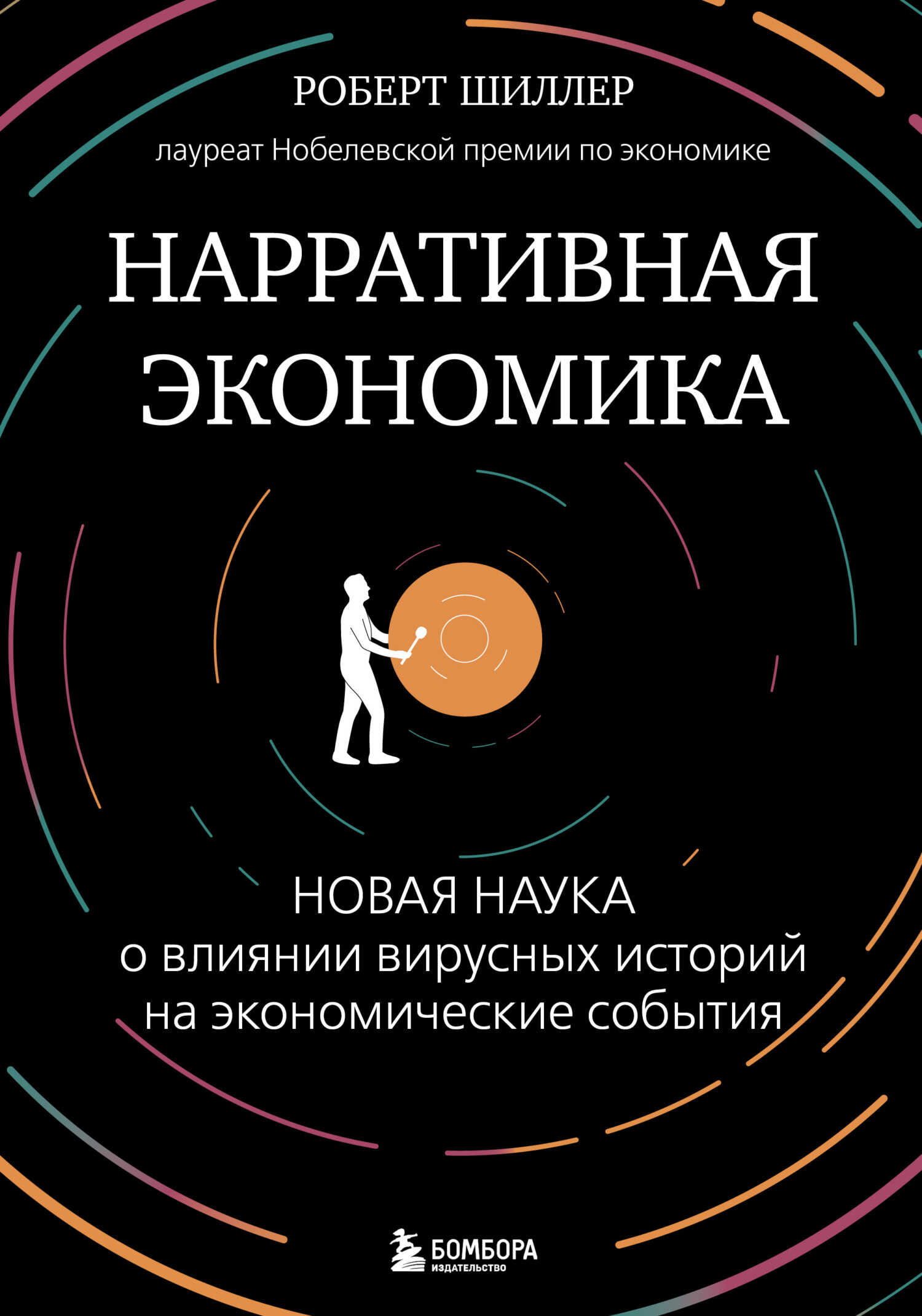Читать книгу - "Нарративная экономика. Новая наука о влиянии вирусных историй на экономические события - Роберт Шиллер"
Аннотация к книге "Нарративная экономика. Новая наука о влиянии вирусных историй на экономические события - Роберт Шиллер", которую можно читать онлайн бесплатно без регистрации
Миром правят не деньги, а истории. О биткоине, который стоит тысячи долларов, потому что люди в него поверили. О компаниях-гигантах, которые «не могут» обанкротиться. О ценах на акции, которые «обязательно» обвалятся в следующем месяце.Роберт Шиллер первым обратил внимание на то, что экономические модели на базе вирусных историй – нарративы – получаются более точными. И получил за это Нобелевскую премию. Согласно его теории, благодаря изучению историй, подкрепленных верой людей и принимающих форму «информационной эпидемии», можно строить более точные прогнозы. Такие прогнозы способны подготовить человечество к экономическим потрясениям и уменьшить их потенциальный ущерб.Именно об этом и рассказано в «Нарративной экономике».Роберт Шиллер – американский экономист, профессор экономики Йельского университета, лауреат Нобелевской премии по экономике за 2013 год, автор бестселлеров New York Times.
Lindbeck, Assar, and Dennis J. Snower. 2001. “Insiders versus Outsiders.” Journal of Economic Perspectives 15(1):165–88.
Litman, Barry R. 1983. “Predicting Success of Theatrical Movies: An Empirical Study.” Journal of Popular Culture 16(4):159–75.
Littlefield, Henry M. 1964. “The Wizard of Oz: Parable on Populism.” American Quarterly 16: 47–58. Reprinted in The American Culture: Approaches to the Study of the United States, edited by Hennig Cohen. Boston: Houghton Mifflin, 1968.
Loewenstein, George F., Elke U. Weber, Christopher K. Hsee, and Ned Welch. 2001. “Risk as Feelings.” Psychological Bulletin 127(2): 267–86.
Long, Elisa F., Naveen K. Vaidya, and Margaret L. Brandeau. 2008. “Controlling Co-Epidemics: Analysis of HIV and Tuberculosis Infection Dynamics.” Operations Research 56(6):1366–81.
Loomes, Graham, and Robert Sugden. 1982. “Regret Theory: An Alternative Theory of Rational Choice under Uncertainty.” Economic Journal 92(368):805–24.
Lorayne, Harry. 2007. Ageless Memory: The Memory Expert’s Prescription for a Razor-Sharp Mind. New York: Black Dog and Leventhal Publishers.
Losh, Molly, and Peter C. Gordon. 2014. “Quantifying Narrative Ability in Autism Spectrum Disorder: A Computational Linguistic Analysis of Narrative Coherence.” Journal of Autism and Developmental Disorders 44 (12): 3016–25.
Lowen, Anice C., Samira Mubareka, John Steel, and Peter Palese. 2007. “Influenza Virus Transmission Is Dependent on Relative Humidity and Temperature.” PLOS Pathogens, https://doi.org/10.1371/journal.ppat.0030151.
Loyd, Jere L. 1975. “Consumer Affairs—State Securities Regulation of Interstate Land Sales.” Urban Law Annual 10:271–82, http://openscholarship.wustl.edu/law_ubranlaw/vol10/iss1/9.
Lucas, Robert E. 1978. “Asset Prices in an Exchange Economy.” Econometrica 46:1429–45.
Luminet, Olivier, and Antoinietta Curci. 2009. “The 9/11 Attacks inside and outside the US: Testing Four Models of Flashbulb Memory Formation across Groups and the Specific Effects of Social Identity.” Memory 17(7):742–59.
Machill, Marcel, Sebastian Kцhler, and Markus Waldhauser. 2007. “The Use of Narrative Structures in Television News.” European Journal of Communication 22(2):185–205.
Mackay, Charles. 1841. Memoirs of Extraordinary Popular Delusions. London: Richard Bentley.
Macmillan, R. H. 1956. Automation: Friend or Foe? Cambridge: Cambridge University Press.
MacMullen, Ramsay. 2003. Feelings in History: Ancient and Modern. Claremont, CA: Regina Books.
Malthus, Thomas Robert. 1798. An Essay on the Principle of Population. Anonymously published, 1798.
Marcus, George E., and Peter Dobkin Hall. 1992. Lives in Trust: The Fortunes of Dynastic Families in Late Twentieth Century America (Institutional Structures of Feeling). Boulder, CO: Westview Press.
Marden, Orison Swett. 1920. Success Fundamentals. New York: Thomas Y. Crowell.
Maren, Stephen, and Gregory J. Quirk. 2004. “Neuronal Signalling of Fear Memory.” Nature Reviews: Neuroscience 5(11):844–52.
Marineli, Filio, Gregory Tsoucalas, Marianna Karamanou, and George Androutsos. 2013. “Mary Mallon (1869–1938) and the History of Typhoid Fever.” Annals of Gastroenterology 26(2):132–34.
Marx, Groucho. 2017 [1959]. Groucho and Me. Muriwai Books.
McCabe, Brian J. 2016. No Place Like Home: Wealth, Community, and the Politics of Homeownership. New York: Oxford University Press.
McCaffery, Edward. 2000. “Cognitive Theory and Tax.” In Cass Sunstein, ed., Behavioral Law and Economics. Cambridge: Cambridge University Press.
McCloskey, Deirdre. 2016. “Adam Smith Did Humanomics: So Should We.” Eastern Economic Journal 42(4):503–13.
McCullough, David. 1993. Truman. New York: Simon & Schuster.
McDaniel, M. A., and G. O. Einstein. 1986. “Bizarre Imagery as an Effective Memory Aid: The Importance of Distinctiveness.” Journal of Experimental Psychology: Learning, Memory, and Cognition 12(1):54–65.
McGinn, Daniel. 2007. House Lust: America’s Obsession with Our Homes. New York: Currency Doubleday.
McHugh, Richard. 1991. “Productivity Effects of Strikes in Struck and Nonstruck Industries.” ILR Review 44(4):722–32.
McQuiggan, Scott W., Jonathan P. Rowe, Sunyoung Lee, and James C. Lester. 2008. “Story-Based Learning: The Impact of Narrative on Learning Experiences and Outcomes.” In Beverley P. Woolf, Esma Aпmeur, Roger Nkambou, and Susanne Lajoie, eds., Intelligent Tutoring Systems, 530–39. Berlin: Springer Verlag. Meadows, Donnella, et al. 1972. Limits to Growth: A Report for the Club of Rome’s Project on the Predicament of Mankind. New York: Universe Books.
Merton, Robert K. 1948. “The Self-Fulfilling Prophecy.” Antioch Review 8(2):193–210.
Merton, Robert K., and Patricia L. Kendall. 1946. “The Focused Interview.” American Sociological Review 51(6): 541–57.
Michaels, Donald N. 1962. Cybernation: The Silent Conquest. Santa Barbara, CA: Center for the Study of Democratic Institutions, 1962, http://ucf.digital.flvc.org/islandora/object/ucf%3A5123.
Michel, Jean-Baptiste, Yuan Kui Shen, Aviva Presser Aiden, Adrian Veres, Matthew K. Gray, The Google Books Team, Joseph P. Pickett, Dale Hoiberg, Dan Clancy, Peter Norvig, Jon Orwant, Steven Pinker, Martin A. Nowak, and Erez Lieberman Aiden. 2011. “Quantitative Analysis of Culture Using Millions of Digitized Books.” Science 331(6014):176–82.
Miguel, Edward, Shanker Satyanath, and Ernest Sergenti. 2004. “Economic Shocks and Civil Conflict: An Instrumental Variables Approach.” Journal of Political Economy 112(4):725–53.
Milad, Mohammed R., Brian T. Quinn, Roger K. Pitman, Scott P. Orr, Bruce Fischl, Scott L. Rauch, and Marcus E. Raichle. 2005. “Thickness of Ventromedial Prefrontal Cortex in Humans Is Correlated with Extinction Memory.” Proceedings of the National Academy of Sciences of the United States of America 102(30):10706–11.
Milad, Mohammed R., Blake L. Rosenbaum, and Naomi M. Simon. 2014. “Neuroscience of Fear Extinction: Implications for Assessment and Treatment of Fear-Based and Anxiety Related Disorders.” Behaviour Research and Therapy 62:17–23.
Miller, Joel C. 2012. “A Note on the Derivation of Epidemic Final Sizes.” Bulletin of Mathematical Biology 74(9):2125–41.
Miłosz, Czesław. 1990 [1951]. The Captive Mind. Translated from the Polish by Jane Zielonko. New York: Vintage International.
Mineka, Susan, and Michael Cook. 1988. “Social Learning and the Acquisition of Snake Fear in Monkeys.” In Thomas R. Zentall and Bennett G. Galef Jr., eds., Social Learning: Psychological and Biological Perspectives, 51–74. Mahwah, NJ: Lawrence Erlbaum Associates.
Mirowski, Philip. 1982. “What’s Wrong with the Laffer Curve?” Journal of Economic Issues 16(3):1815–28.
Mitchell, Daniel J. B. 1985. “Wage Flexibility: Then and Now.” Industrial Relations 24(20):266–79.
Mitchell, Wesley C., and Arthur F. Burns. 1938. Statistical Indicators of Cyclical Revivals, Bulletin 69. New York: National Bureau of Economic Research, 1938, https://www.nber.org/chapters/c4251.pdf.
Reprinted in Geoffrey Moore, Business Cycle Indicators. Princeton, NJ: Princeton University Press, 1961.
Mokyr, Joel. 2013. “Culture, Institutions, and Modern Growth.” In Sebastian Galiani and
Прочитали книгу? Предлагаем вам поделится своим впечатлением! Ваш отзыв будет полезен читателям, которые еще только собираются познакомиться с произведением.
Оставить комментарий
-
 Вера Попова27 октябрь 01:40
Любовь у всех своя-разная,но всегда это слово ассоциируется с радостью,нежностью и счастьем!!! Всем добра!Автору СПАСИБО за добрую историю!
Любовь приходит в сентябре - Ника Крылатая
Вера Попова27 октябрь 01:40
Любовь у всех своя-разная,но всегда это слово ассоциируется с радостью,нежностью и счастьем!!! Всем добра!Автору СПАСИБО за добрую историю!
Любовь приходит в сентябре - Ника Крылатая
-
 Вера Попова10 октябрь 15:04
Захватывает,понравилось, позитивно, рекомендую!Спасибо автору за хорошую историю!
Подарочек - Салма Кальк
Вера Попова10 октябрь 15:04
Захватывает,понравилось, позитивно, рекомендую!Спасибо автору за хорошую историю!
Подарочек - Салма Кальк
-
 Лиза04 октябрь 09:48
Роман просто супер давайте продолжение пожалуйста прочитаю обязательно Плакала я только когда Полина искала собаку Димы барса ♥️ Пожалуйста умаляю давайте еще !))
По осколкам твоего сердца - Анна Джейн
Лиза04 октябрь 09:48
Роман просто супер давайте продолжение пожалуйста прочитаю обязательно Плакала я только когда Полина искала собаку Димы барса ♥️ Пожалуйста умаляю давайте еще !))
По осколкам твоего сердца - Анна Джейн
-
 yokoo18 сентябрь 09:09
это прекрасный дарк роман!^^ очень нравится
#НенавистьЛюбовь. Книга вторая - Анна Джейн
yokoo18 сентябрь 09:09
это прекрасный дарк роман!^^ очень нравится
#НенавистьЛюбовь. Книга вторая - Анна Джейн





